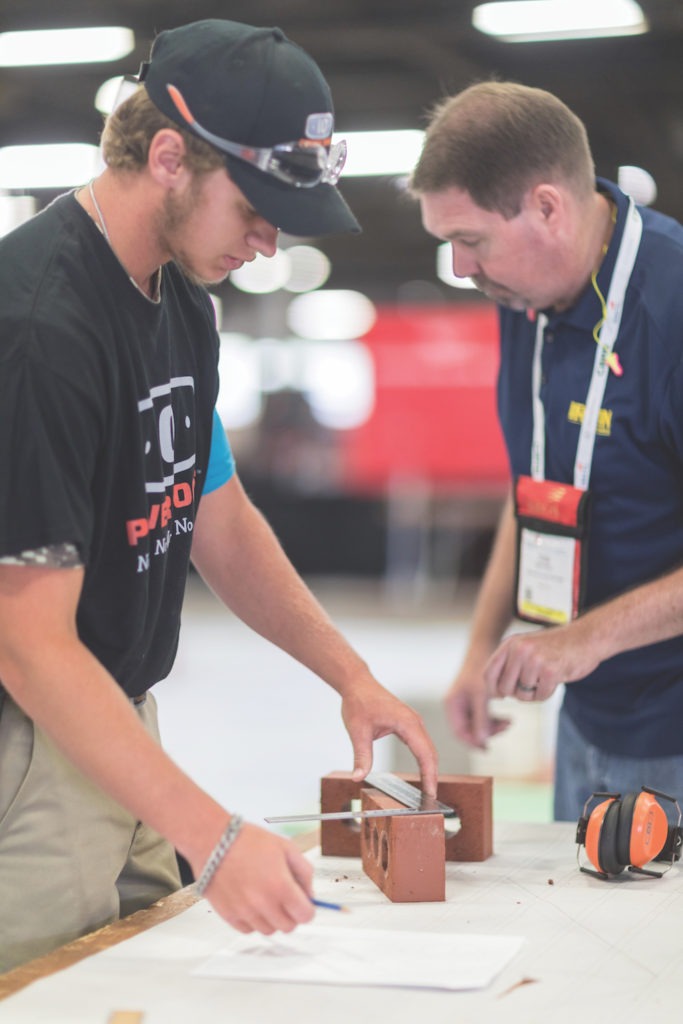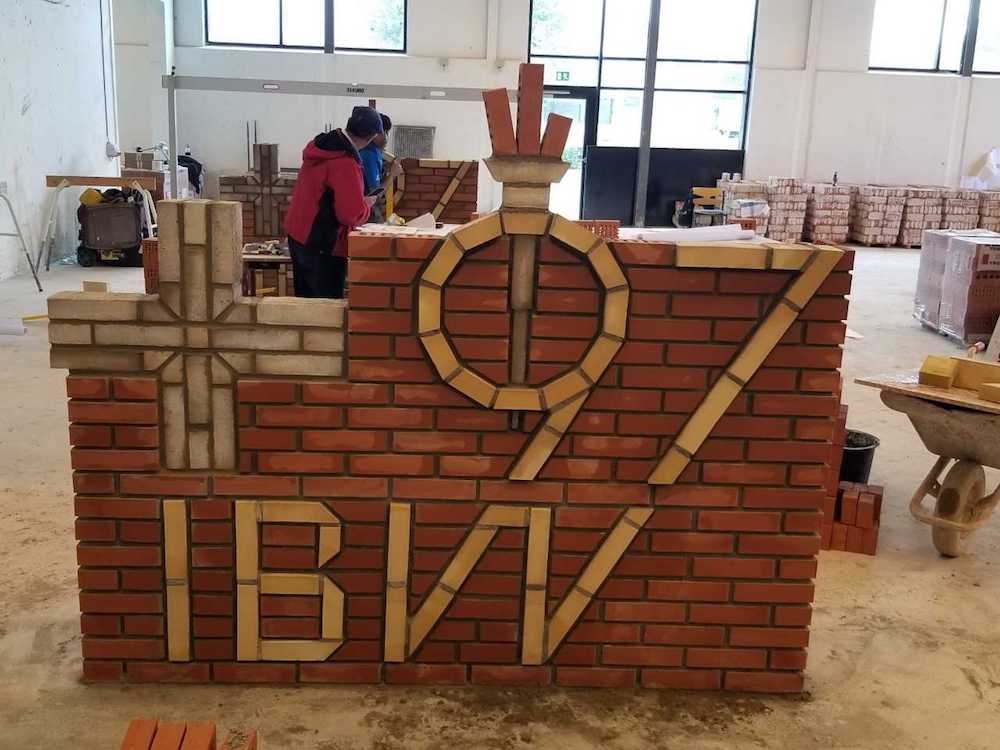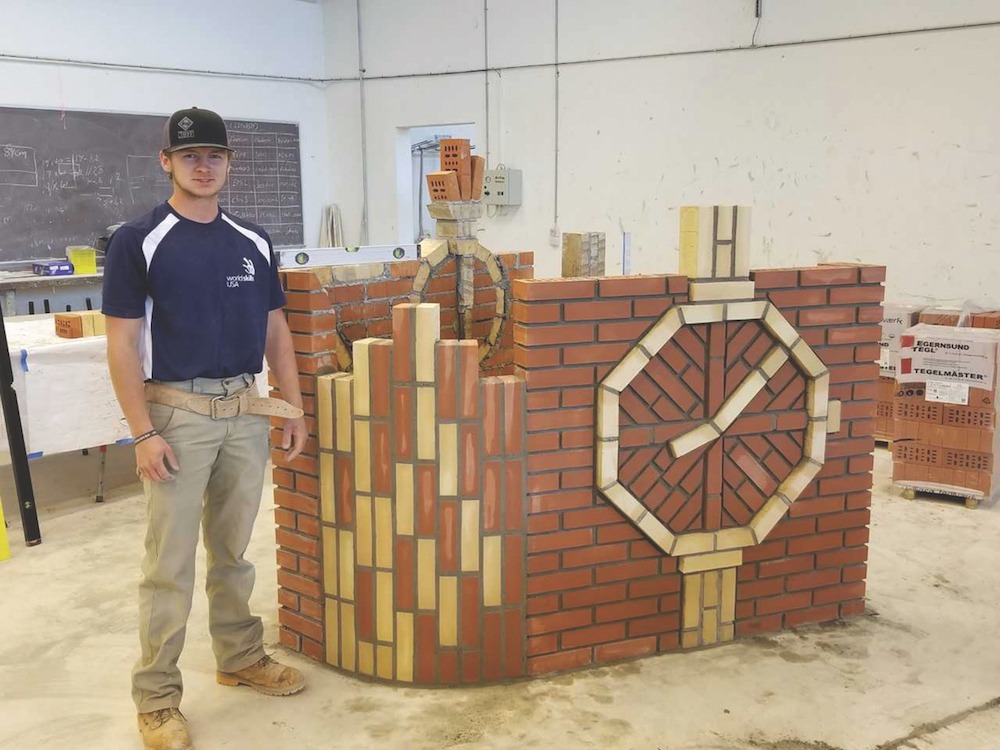GEN NXT: Kelby Thornton
Words: MASONRY Magazine
Photos: Kelby Thornton
Editor’s Note: In this month’s installment of our Generation Next series, we talked with mason Kelby Thornton of McGee Brothers in Monroe, NC. Kelby will be heading to Russia to represent USA in the WorldSkills masonry competition. We’d like to wish Kelby the best of luck in Russia and to thank him for taking the time to chat with us. We would also like to thank JagClamp for the continued sponsorship of this series.
Masonry Magazine: Tell us a little bit about yourself.
Kelby Thornton: My name is Kelby Thornton. I’m 19, and I live in Midland, North Carolina. Ever since I was a kid, I’ve always enjoyed doing hands-on construction work alongside my dad. That is pretty much the pathway to anything we do. I currently work at McGee Brothers full time, and I will also be representing USA on the WorldSkills team.
M.M.: You said that you worked with your dad, is that how you got interested in the masonry industry?
K.T.: Yes, ma’am. My dad actually did a bunch of retaining walls and custom stonework, and that’s really what caught my interest. I wanted to be more like my dad, and so that’s what I did. Now I’m a brick mason and I do a bunch of custom work for people. Like I said before, I have a full time job, so I’m staying busy and I’m always trying to help people out.
M.M.: So, you work full time with McGee Brothers, what is your current role?
K.T.: I’m a mason, but I’ll be moved up to assistant foreman, after all of my WorldSkills stuff.
M.M.: Wow, assistant foreman at 19 sounds like a great accomplishment! Tell us more about the role.
K.T.: So have your supervisor, which has four or five crews underneath him, and the leader of each crew is called a foreman. You also have your assistant foreman, which is the next step down if the foreman is not there. If the foreman leaves for another job or to get something done. The assistant foreman’s role is to go assist the foreman. It’s a big responsibility.
M.M.: It sounds like a big role. So, did you take any classes in high school or do an apprenticeship before you started working full time at McGee Brothers?
K.T.: Actually, I did. My freshman year I joined SkillsUSA, and I won a prize at a competition toward the end of my freshman year. When I went into my sophomore year, I went on to compete in Greensborough, North Carolina for the State Competition, and I placed fifth. So then, I pushed myself, I was like, ‘this isn’t good enough, I’m not going to settle for that, I’ve got two more years, so I’m going to see what I can do’ My Junior year, I went to a Regional Competition at Lowes in Concord, NC, and I placed first.

So I knew what I’m doing now and I had pulled myself together. I figured out how I can better myself. In 2016, I went to Greensborough again and placed first. After placing first at the State Competition, you’re moved on to go to Louisville, Kentucky for the National Competition. In Louisville, Kentucky, I placed first that year as well. I told myself I have one more year to do this, so I’ll make myself even better. So, I kept practicing, and I was working for myself during school, and just trying to pull all my detailed work together, and trying to perfect what I wanted to do.
My senior year, I came back to the Regional Competition at Lowes, we had three hours to build the wall and I finished mine in like two hours. I placed first and knew my speed had gotten faster. I went to Greensborough for the State Competition and I placed first again. Then I went to Louisville, Kentucky and I actually set three records on the wall that I laid, and placed first.
M.M.: How does it feel to compete in WorldSkills?
K.T.: Competing in WorldSkills is definitely something I’ve dedicated my life to, more so all of my time and it feels great. Just because every bit of hard work, time, and effort that I’ve put into laying brick has brought me this far. I can carry the USA on my back now and that feels pretty good.
M.M.: How are you preparing for the competition?
K.T.: I’m practicing on weekends, doing a lot more detailed and custom work for customers, and just working more hours. I usually work 50-55 hours a week, so I’m staying busy.
M.M.: What do you mean by custom work?
K.T.: It is really detailed and intricate work. There’s a lot of cutting involved, and it can range from arches, a mixture of stone, precast, brick, and block, custom fireplaces, walls, driveways, columns.

M.M.: How does your prep for WorldSkills versus SkillsUSA prep?
K.T.: The main difference is practicing my cuts, and making sure that those are precise so everything comes out to the correct measurements.
M.M.: Do you have to do everything from start to finish for the project? So when you say practice your cuts, you mean the brick?
K.T.: Yeah, cutting the brick with the saw, because it’s takes everything I’ve done at SkillsUSA but taken to a whole other level. WorldSkills is a completely different competition, it’s nothing like State, it’s nothing like Nationals, it’s beyond that. It’s literally breaking down the best of the best and putting them where they need to be. It’s more intricate, a lot more detail, and it’s graded. The walls are scored and graded a lot harder than any other place.
M.M.: That sounds intense, but like it will be a really good time.
K.T.: Oh yeah, it’s definitely intense and it’ll be a good time. Travelling out of the country, meeting new people, I gotta have fun with life. You know, that’s my main thing, to enjoy what I’m doing. I enjoy what I do.
M.M.: So where do you see yourself in five to 10 years?
K.T.: In five to 10 years, honestly, I’ll probably be running my own company. That’s what I want to do, I want to be a successful business owner of a custom masonry business.
M.M.: What’s going to keep you interested in the industry?
K.T.: What’s going to keep me interested in this industry is definitely striving to be like my dad, because he was a successful business owner, and seeing how far that took him makes me want to be more like him. I’m 19, I started off with the world ahead of me, and if I can go ahead and get my foot in that door, then everything out there is just waiting for me.

M.M.: How is it working with older guys in the industry?
K.T.: Working with the older people in the industry is actually pretty helpful because they know all the small tricks and stuff that the younger people don’t know. I learn so much more because they’re more experienced.
M.M.: You don’t get treated any differently because you’re younger?
K.T.: Oh no no, sometimes they’ll pick on me, but, you know, more so to help me out. We all have a great time.
M.M.: Do you have any advice for someone your age or younger looking to get into the industry?
K.T.: I would definitely push them to join the industry. I mean the pay is good, it’s definitely a good way to build your future and to be successful. It’s a job that’s going to keep you busy five, to maybe six days out of the week. You can start your own business or company in this industry. It takes a lot of responsibility, but then again it also builds character and makes you into a better person.
M.M.: What’s your proudest moment?
K.T.: It’s probably when I went to Louisville, Kentucky for the third time, and I was competing against this kid from Ohio. Whoever laid the best wall was the competitor that was going to represent USA [in WorldSkills]. When we went to the award ceremony that night and they called my name I about lost it, it was great.
M.M.: Have you had any challenges thus far in your career?
K.T.: Not really, because I know that if I put my mind to anything I can accomplish anything. So there’s not much that’s going to get in my way. I love the challenges, I know I can better myself because of them. It’s really not too bad.
M.M.: What does your day-to-day work lifestyle look like?
K.T.: I get up at 4:30 every morning, wake up, cook breakfast, run by the McGee shop, pick up whatever we need for that day and go meet everybody out at the jobsite. We get started around 7 everyday and then push ourselves to lay as many brick and block we can throughout the day. At 6 or 6:30, we pack up and go home.
M.M: Do you have any other family members in the masonry industry?
K.T.: My great-great-great grandpa was actually a brick mason in the 1800s, and yesterday they actually tore down his house yesterday where he lived. We found so many masonry tools it was insane, I was honestly astonished. My grandpa owned his own construction company, both of my uncles are custom home builders and contractors, and my aunt is a welder. Masonry really runs in the family, construction is in my blood.